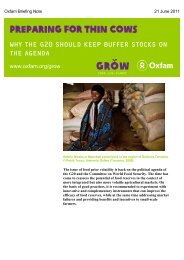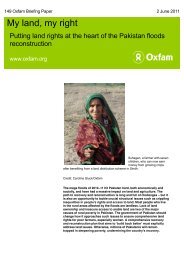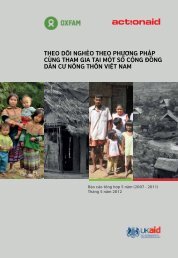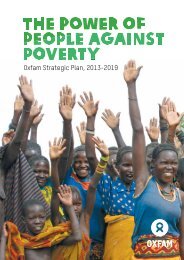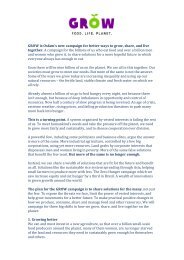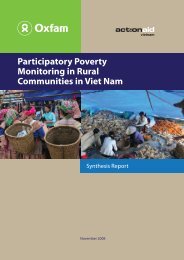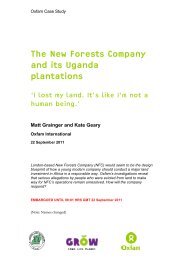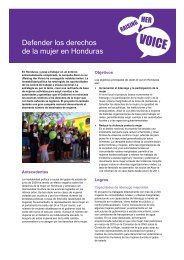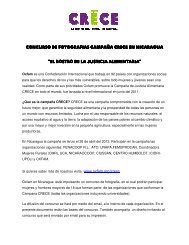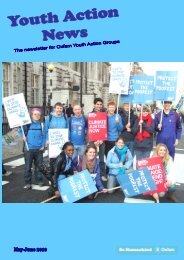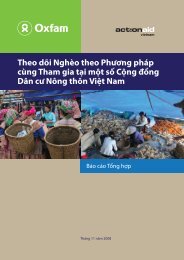Untitled - Oxfam Blogs
Untitled - Oxfam Blogs
Untitled - Oxfam Blogs
You also want an ePaper? Increase the reach of your titles
YUMPU automatically turns print PDFs into web optimized ePapers that Google loves.
Impacts of Price Hikes<br />
on the Life and Livelihoods<br />
of the Urban Poor<br />
Figure 4.3: Monthly expenditure structure of migrant workers<br />
Hai Phong<br />
Go Vap - HCMC<br />
Remittance to<br />
home<br />
16%<br />
Self-savings<br />
12%<br />
Private<br />
purchase<br />
5%<br />
Contributiions<br />
to weddings/<br />
funerals<br />
9%<br />
Others<br />
7%<br />
House rental<br />
7%<br />
Recreation/<br />
refreshment<br />
5%<br />
Food & Drink<br />
27%<br />
Clothes<br />
6%<br />
Travel<br />
6%<br />
Remittance to<br />
home<br />
12%<br />
Self-savings<br />
11%<br />
Private<br />
purchase<br />
2%<br />
Contributiions<br />
to weddings/<br />
funerals<br />
6% Recreation/<br />
refreshment<br />
1%<br />
Others<br />
7%<br />
Travel<br />
5%<br />
Clothes<br />
4%<br />
House rental<br />
17%<br />
Food & Drink<br />
35%<br />
Source: Questionnaire survey of 120 migrant workers in Hai Phong and Go Vap - HCMC (june-July 2008)<br />
Selling/Buying Practices. Selling and buying transactions in the urban areas are commonly of the cashon-delivery<br />
nature. In very few cases where they have close relationship with the agents the poor households<br />
can buy things on credit or the agents can get a small loans from the wholesaler (for example, they can buy<br />
five kg of rice and pay when they next make a purchase).<br />
The habit of stockpiling things no longer exists (it was very common in the northern cities before the<br />
introduction of the “doi moi” policy). Although urban residents did stockpile rice during the two-day “virtual<br />
hike” of prices in April 2008 because of rumors of shortages. However the hike did not last long thanks clear<br />
to communication by the authorities and prompt arrangements for sufficient rice supply for the big cities.<br />
4.3 Impacts of Price Hikes on the Lives and Livelihoods of the Urban Poor<br />
As incomes and social assistance are not rising in line with the prices of foods and services most urban poor<br />
and near-poor are in a very difficult situation due to their reduced purchasing power (except for certain<br />
suburban areas where crop farming is still possible and the farmers can manage to partly or fully meet their<br />
own demand for food).<br />
4.3.1 Impact on the permanently registered urban poor<br />
The permanently registered poor (and near-poor) is facing a great challenge as a result of the ‘price storm’.<br />
In particular, pensioners and social assistance recipients are struggling as prices of food and other essential<br />
products are rising. Although the Government has applied a 20 percent increase in pension payments since<br />
the beginning of 2008, it is considered too little to offset the increase in the cost of living in urban areas<br />
over the last two years. Those who have resigned from the Government employment with a severance<br />
package and are not entitled to pension payments also suffer since they do not have any alternative sources<br />
of income. They rely on support of their children or work irregular poorly paid jobs.<br />
“Our pension payment as of end of 2007 was 700,000 VND/month for the two of us, an old<br />
couple. We had managed to survive the year before. At the end of 2007 when the<br />
Government announced a salary increase everything suddenly became so expensive, from<br />
food to rice and fuels. In January 2008, we received a 20 percent increase in our pension<br />
payment to 840,000 VND/month. We were able to pay for rice, gas, fish sauce, salt and some<br />
extra meat. However, as of April, 20 kg of rice cost 300,000 VND. We had only 540,000<br />
VND left to pay for everything else including electricity, gas, medications, fish sauce and salt.<br />
Our food intake has been cut to only vegetables and small fish now. Prices keep rising while<br />
57



